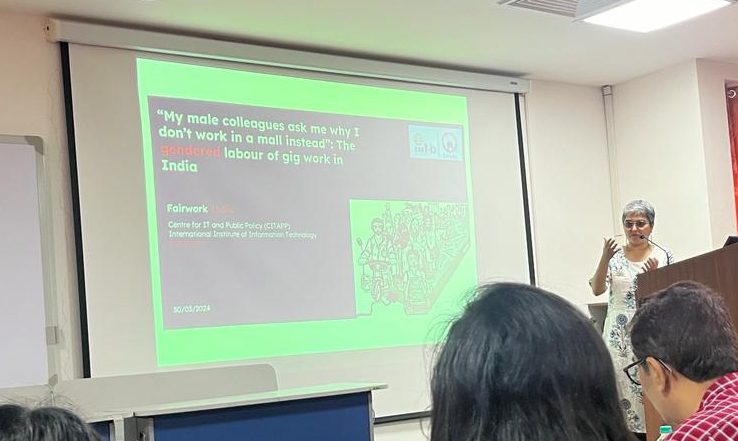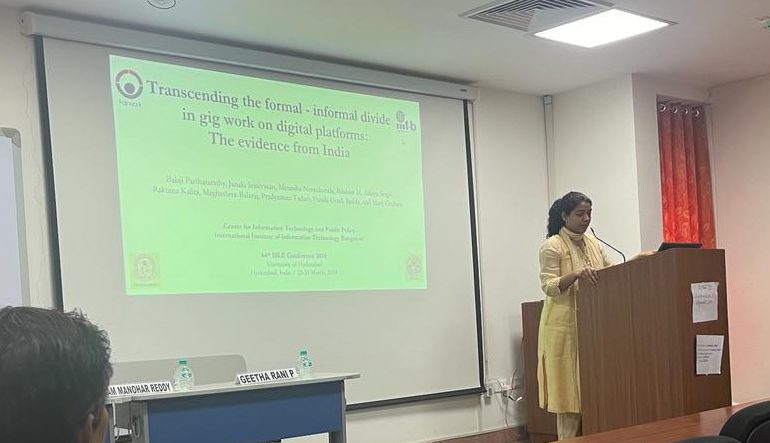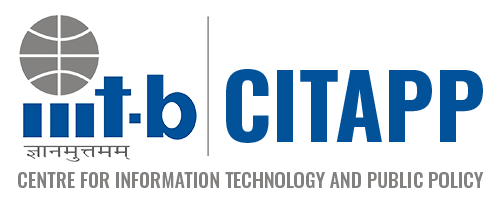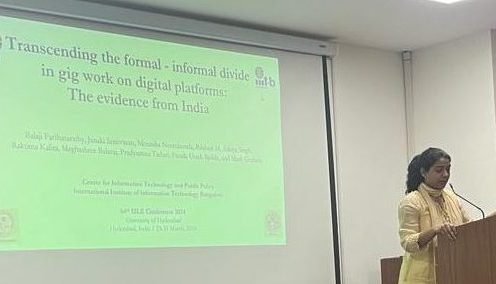Dates: 29 – 31 March, 2024
Fairwork India (based out of CITAPP) participated in the 64th Annual Indian Society for Labour Economics (ISLE) Conference. The Conference was hosted by the University of Hyderabad, with the Department of Liberal Arts, IIT Hyderabad, the Centre for Economic and Social Studies (CESS), Hyderabad and the Council for Social Development (CSD), Hyderabad.
CITAPP faculty Balaji Parthasarathy and Janaki Srinivasan, and researcher Mounika Neerukonda were in attendance. They presented two papers.

“My Male Colleagues Ask Me Why I Don’t Work in a Mall Instead”: The Gendered Labour of Gig Work in India Janaki Srinivasan, Balaji Parthasarathy, Mounika Neerukonda, Bilahari M, Meghashree Balaraj, Raktima Kalita, Aditya Singh and Mark Graham.
Abstract: Much research over the past few years indicates that the “flexibility” promised by platform-based gig work doesn’t look like flexibility in practice for gig workers. Furthermore, what kinds of resources and social networks a gig worker has access to; the assumptions people make about them and their skill levels; and the stigma attached to them and the work they do because of their social location, all fundamentally shape how flexibility works for individual gig workers. A key aspect of gig workers’ social location is gender. In this paper, we draw on Fairwork India’s interviews between 2019 and 2023 to examine how gender shapes the way gig workers experience (in)flexibility in different aspects of their work. From the choice that gig workers make of sectors and platforms to work in, to their everyday interactions at platform hubs, hangout zones and customer homes, and the perceived safety concerns of their family members, the paper illustrates the gendered bones of gig work in practice.

Transcending the Formal-informal Divide in Gig Work on Digital Platforms: The Evidence from India Balaji Parthasarathy, Janaki Srinivasan, Mounika Neerukonda, Bilahari M, Meghashree Balaraj, Raktima Kalita, Aditya Singh and Mark Graham.
Abstract: Digital platforms have grown thanks to institutional changes that have emphasised flexible labour markets, aided by technological advances. As platforms mediate an increasing number of services, the dominant work opportunity they offer is gig work to independent contractors. Thanks to a power asymmetry between gig workers and platforms, and little regulatory control over gig work, the conditions of work are largely determined by platforms. Nevertheless, there is hope vested in the developmental possibilities of the platform economy and the gradual formalization of gig work. This paper examines the possibilities and the tensions inherent to any formalization by drawing on evidence from India, which has a large and rapidly growing platform economy.
View the Book of Abstracts of the ISLE conference here.
Source: https://isleconference.com/

